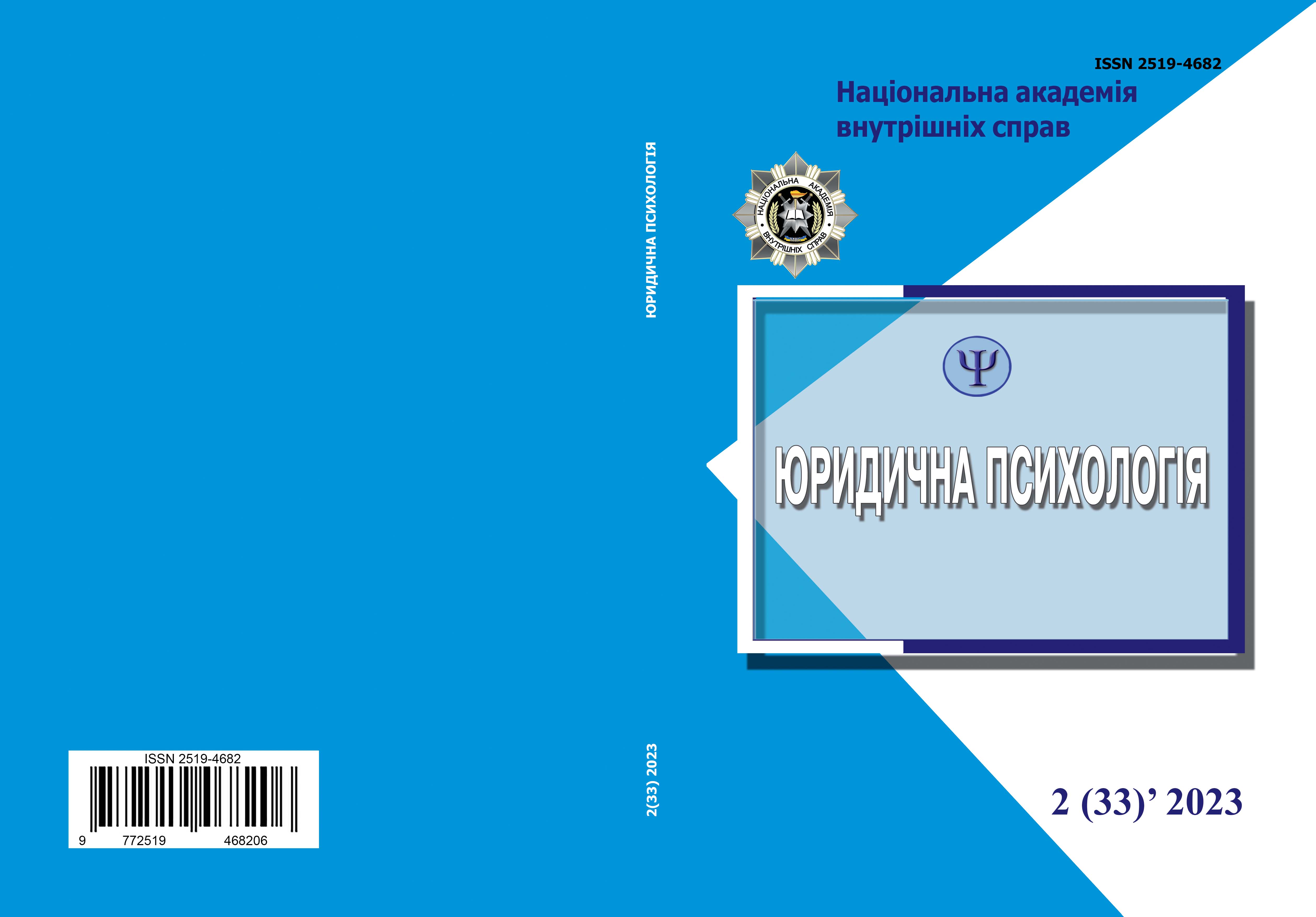Планування розслідування кримінальних правопорушень у системі організації розслідування: тактико-психологічний аспект
Анотація
Анотація. Розслідуванню кримінальних правопорушень, як і кримінальному судочинству загалом, властивий організаційний, плановий принцип. Метою статті є висвітлення тактико-психологічних аспектів планування розслідування кримінальних правопорушень у системі організації розслідування. Основу методологічного інструментарію становлять загальнонаукові та спеціальні методи, які є засобами наукового дослідження, а також наукові праці іноземних й українських авторів, які прямо чи опосередковано здійснювали дослідження питань, що стосуються визначення поняття та змісту планування розслідування в системі організації розслідування кримінальних правопорушень, його тактико-психологічних засад. Систематизовано наукові погляди щодо поняття «планування» та його основних ознак. Виокремлено основні принципи планування розслідування кримінальних правопорушень. Акцентовано на невід’ємності використання принципу взаємодії під час складання плану розслідування. Класифіковано рівні планування розслідування за територіальним принципом. Обґрунтовано важливість використання слідчим (детективом, дізнавачем) у процесі планування розслідування навичок і знань психології, оскільки на його ефективність впливатимуть професійні й творчі вміння, які становитимуть сукупність тактико-психологічних засад. Наукова новизна публікації полягає в характеристиці й виокремленні тактико-психологічних засад планування розслідування, що становлять ґрунтовані на знаннях криміналістичної тактики і психології слідчої діяльності сукупність прийомів, використовуваних у процесі планування розслідування кримінальних правопорушень.
Ключові слова: організація розслідування; планування; план розслідування; криміналістична тактика; психологія; тактико-психологічні засади; слідчий; дізнавач; детектив.
Завантаження
Посилання
Balan, M. (2020). Interaction of the investigator and other subjects of criminal proceedings during the investigation of violations of the state border of Ukraine. Entrepreneurship, economy and law, 3. doi: 10.32849/2663-5313/2020.3.48.
Busel, V.T. (Eds.). (2005). A large explanatory dictionary of the modern Ukrainian language. 250,000. Kyiv; Irpin: Perun.
Chornous, Yu.M., & Lisitska, A.V. (2022). Peculiarities of the organization of the investigation of criminal offenses committed by arson. Scientific Bulletin of the International Humanitarian University, 59, 74-79. doi: 10.32841/2307-1745.2022.59.14.
Khan, H.A. (2003). Principles of organization of crime investigation. Bulletin of the Luhansk Academy of Internal Affairs, 1, 153-160.
Khan, O.O. (2021). Theoretical basis of planning and programming of investigative (search) actions. V.A. Zhuravel (Eds.). Odesa: Helvetyka.
Kolodina, A.S. (2019). Heuristic approach to the construction of research methodology: actual problems. Scientific bulletin of public and private law, 3(2), 142-149. doi: 10.32844/2618-1258.2019.3-2.22.
Konovalova, V.O. (2001). Organization and planning of the investigation. Concepts and principles of planning. Planning technique. Criminology. V.Yu. Shepitko (Eds.). Kyiv: In Yure.
Kravchuk, I.I., & Andrushko, M.V. (2021). Concepts and principles of the interaction of the investigator with operative units in criminal proceedings. Juris Europeans Scientia, 5, 80-84. doi: 10.32837/chern.v0i5.286.
Moiseiev, Ye.M., Tatsii, V.Ya., & Shemshuchenko, Yu.S. (et al.). (2009). International police encyclopedia (vol. 5). Kyiv: Atika.
Olishevskyi, O.V. (2013). Principles of organization of crime investigation. Bulletin of the Criminological Association of Ukraine, 3, 226-232.
Orlov, Yu.V. (2016). Criminological planning. Bulletin of the Criminal Law Association of Ukraine, 2(7), 358-360.
Orzhynska, V. (2021). Use of general scientific methods in investigative practice. Entrepreneurship, economy and law, 2, 272-276. doi: 10.32849/2663-5313/2021.2.48
Ostapchuk, D., & Rusnak, K. (2021). Peculiarities of planning the investigation of crimes committed by organized criminal groups. Bulletin of E. O. Didorenko Luhansk State University of Internal Affairs, 1(93), 297-305. doi: 10.33766/2524-0323.93.297-305.
Plishkin, V.M. (1999). Theory of management of internal affairs bodies. Yu.F. Kravchenko (Eds.). Kyiv: Nats. akad. vnutr. sprav.
Pohoretskyi, M.A., & Serhieieva, D.B. (Eds.). (2017). Forensic tactics (2nd ed.). Kyiv: Alerta.
Puonti, A. (2004). Tools for Collaboration: The Use and Development of Tools in Interagency Economic Crime Investigations. Mind, Culture, and Activity, 11(2), 133-152.
Piaskovskyi, V.V., Chornous, Yu.M., & Ishchenko, A.V. (et al.). (2015). Forensics. Kyiv: Tsentr uchb. lit.
Piaskovskyi, V.V., Chornous, Yu.M., & Samodin, A.V. (et al.). (2020). Criminalistics (2nd ed.). Kharkiv: Pravo.
Romtsiv, O. (2019). Planning as an important direction of the organization of the investigation of crimes in the field of official activity in the conditions of countermeasures. Bulletin of the Lviv Polytechnic National University, 6(22), 199-204. doi: 10.23939/law2019.22.199.
Savchuk, M.V. (2019). Organizational and tactical support for the investigation of terrorist acts committed with the use of explosive devices (Doctoral dissertation, Lviv, Ukraine).
Shcherbak, N.V. (2020). Strategic planning in the state administration system. State administration and local self-government, 3(46), 52-60. doi: 10.33287/102045.
Sokolenko, M.O. (2015). Algorithmization and creative approach in interrogation tactics. The issue of fighting crime, 29, 236-242.
Spilnyk, S.I. (2020). The state of scientific research of forensic activity of the state criminal enforcement service of Ukraine. Science of law, 11(113), 89-97. doi: 10.32844/2222-5374-2020-113-11.12.
Stancu, E. (2010). Tratat de Criminalistică, Ediţia a V-a, revăzută şi adăugită. Editura Universul Juridic.
Synoverskyi, A.I. (2023). Organization and planning of the investigation of criminal offenses committed by organized criminal groups under martial law. Science and perspective, 1(20), 170-182. doi: 10.52058/2695-1592-2023-1(20)-170-182.
Vynohradov, V.I. (2019). Planning the investigation of crimes in the sphere of public procurement. Actual problems of politics, 63, 255-261. doi: 10.32837/app.v63i0.22.
Yurkiv, R.R. (2021). Peculiarities of planning an investigation into the facts of bribery of medical workers. Scholarly notes of V. I. Vernadsky Tavri National University, 32(71), 1, 120-125. doi: 10.32838/TNU-2707-0581/2021.1/21.
Zhuravel, V.A. (2008). Problems of algorithmization and programming of crime investigation. Bulletin of the Academy of Legal Sciences of Ukraine, 2, 191-199.
Переглядів анотації: 78 Завантажень PDF: 305
- Автори залишають за собою право на авторство власної праці та передають журналу право першої публікації цієї роботи на умовах ліцензії Creative Commons Attribution License, яка дає змогу іншим особам вільно розповсюджувати опубліковану працю з обов’язковим посиланням на авторів оригінальної роботи та першу публікацію статті в цьому журналі.
- Автори мають право укладати самостійні додаткові угоди щодо неексклюзивного розповсюдження роботи у тому вигляді, в якому вона була опублікована в журналі (наприклад, розміщувати статтю в репозитарії установи або публікувати у складі монографії), за умови збереження посилання на першу публікацію роботи у цьому журналі.
- Політика журналу дає змогу і заохочує розміщення авторами в Інтернеті (наприклад, у електронних сховищах установ або на особистих веб-сайтах) рукопису статті як до подання цього рукопису до редакції, так і під час його редакційного опрацювання, оскільки це сприяє продуктивній науковій дискусії та позитивно впливає на оперативність та динаміку цитування опублікованої роботи.




